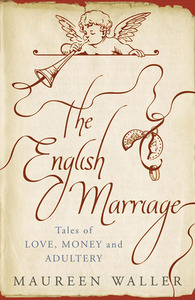Take a photo of a barcode or cover
informative
medium-paced
Heavy on the anecdote, light on the analysis. Which is not too bad for an interesting bedtime read
Many today are sceptical about the role of marriage in a secular society, consider it devalued and degraded by our open and permissive culture, or think that the modern ease of divorce means people give up on relationships too easily. Many people think the sacredness of marriage has been lost somewhere in all the excess and hype of ever bigger weddings and stag-dos and the acrimony and mercenary nature of many divorces. But to a certain extent, perhaps modern marriage is actually shifting back closer to what it used to be, before the Victorian concept of the romantic, companionate marriage set unrealistic expectations and ideals.
For much of English history at least, as Maureen Waller recounts, marriage was almost always about money. It was about alliances between great families, exchanges of land, or daughters with dowries or expectations of inheritances, about workmates and helpmeets. Love had very little to do with it. Women were all but bought and sold in the marriage market, (indeed, wife-sales in which men would auction off their wives were a rare but known phenomenon) and whilst theoretically no-one could be married against his or her will, in reality most women had very little choice in the matter. The history of marriage for women has not been a happy one, and a 'marriage of equals' was no such thing. Let's not forget, it was only in the last century that women attained the right to vote; only in the last 150 years that women were recognised as having any legal existence at all outside of their marriage.
This book is less a history of the concept of marriage in English society, and more a history of wives in England in the last five centuries. These pages are a sad recounting of women passed from father to husband with little choice, women beaten and battered and abused, women murdered and imprisoned against their will, women forced to marry against their inclination, the double sexual standard whereby adultery in a man was accepted but was considered treasonous in women, men stealing their wives' fortunes with ease, mothers denied access to their children. It's a sad and sorry tale, with a few rare bright spots of long, happy and successful marriages to buck the prevailing trend of sexual inequality and downright abuse. Reading it, one can only thank whatever deity or impersonal universal force one believes in for the fortune of being born in the era of women's liberation, however incomplete that revolution may still be.
For much of English history at least, as Maureen Waller recounts, marriage was almost always about money. It was about alliances between great families, exchanges of land, or daughters with dowries or expectations of inheritances, about workmates and helpmeets. Love had very little to do with it. Women were all but bought and sold in the marriage market, (indeed, wife-sales in which men would auction off their wives were a rare but known phenomenon) and whilst theoretically no-one could be married against his or her will, in reality most women had very little choice in the matter. The history of marriage for women has not been a happy one, and a 'marriage of equals' was no such thing. Let's not forget, it was only in the last century that women attained the right to vote; only in the last 150 years that women were recognised as having any legal existence at all outside of their marriage.
This book is less a history of the concept of marriage in English society, and more a history of wives in England in the last five centuries. These pages are a sad recounting of women passed from father to husband with little choice, women beaten and battered and abused, women murdered and imprisoned against their will, women forced to marry against their inclination, the double sexual standard whereby adultery in a man was accepted but was considered treasonous in women, men stealing their wives' fortunes with ease, mothers denied access to their children. It's a sad and sorry tale, with a few rare bright spots of long, happy and successful marriages to buck the prevailing trend of sexual inequality and downright abuse. Reading it, one can only thank whatever deity or impersonal universal force one believes in for the fortune of being born in the era of women's liberation, however incomplete that revolution may still be.
